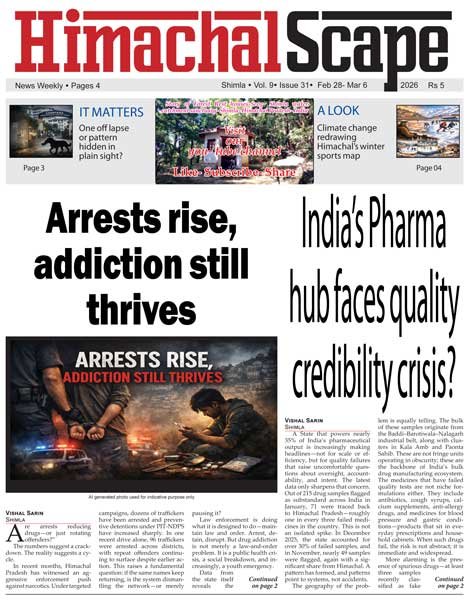
Old photo used for indicative purpose only
Shimla, Feb 28
Shrinking Funds, Soaring taxes is how the CPIM, alliance partners of ruling Congress term the Shimla MC annual budget. Passed on February 27, has drawn sharp criticism from the local Communist Party of India (Marxist) (CPIM) and former Shimla Mayor Sanjay Chauhan, who have labeled it as anti-people and burdensome for city residents. The budget, presented by current Mayor Surinder Chauhan, proposes several fee hikes that the CPIM claims will disproportionately impact the common public while benefiting private corporations.
Over the last eight years, the budget of the Shimla Municipal Corporation has seen a drastic reduction, even as taxes and fees imposed on the public have tripled, he rued. In 2017-18, under the CPIM’s tenure, SMC’s total income stood at Rs 401.67 crore with an expenditure of Rs 357.13 crore, stated Chauhan. Adding that, by 2022-23, during the BJP’s administration, the income had dwindled to Rs 224.30 crore, with expenditure closely following at Rs 224.14 crore. The current 2025-26 budget under the Congress rule shows an even sharper decline, with both income and expenditure fixed at Rs 188.35 crore, he informed.
Despite this significant budgetary reduction, the burden of taxes on the public has increased substantially. CPIM general secretary Jagat Ram strongly opposed the 10 per cent hike in water and garbage charges announced in the budget, calling it unjustified given the current inflationary pressures on households. According to Ram, water distribution in Shimla was once managed directly by the Municipal Corporation but was later transferred to the Shimla Water Management Corporation and subsequently to the private company Suez. He alleged that the consistent increase in water tariffs only serves the interests of private companies like SJPN and Suez.
The hike in garbage collection fees has also drawn heavy criticism. When the scheme was initially introduced, residents paid just Rs 37 per month. This fee has now surged to Rs 142 per month under the new budget. Furthermore, the 4 per cent rise in property tax has added to the mounting financial pressure on residents.
Adding to the opposition’s concerns, the budget’s focus on large-scale infrastructure projects has also faced scrutiny. The ₹188.35 crore budget for 2025-26 includes a projected ₹500 crore under the Smart City initiative, primarily for the development of commercial complexes and municipal offices. Among the expenditures, nearly 70%—₹70.51 crore—would go towards salaries and pensions. Major infrastructure allocations include ₹60 crore for a Waste to Wonder Park, ₹15 crore for a solar lighting initiative, and ₹92.79 crore for multi-level parking complexes in areas like Vikas Nagar and IGMC Auditorium. The Smart City multiplex, spanning from Cart Road to Lakkar Bazar, is projected at ₹500 crore. Critics argue that while these projects aim at modernization, they overlook immediate public welfare concerns.
Former Mayor Sanjay Chauhan criticized the budget as a reflection of the neo-liberal policies being implemented at both the national and state levels. He argued that these policies prioritize the profits of private corporations over public welfare and development. Chauhan called for collective action to reverse these economic policies, which he claimed were shifting essential services into private hands at the expense of the people.
In response to the budget, the CPIM has demanded an immediate rollback of the proposed fee hikes and the return of water distribution responsibilities to the Municipal Corporation. The party warned that if these demands are not met, they will mobilize city-wide protests to pressure the authorities into reconsidering the budget’s provisions.

The HimachalScape Bureau comprises seasoned journalists from Himachal Pradesh with over 25 years of experience in leading media conglomerates such as The Times of India and United News of India. Known for their in-depth regional insights, the team brings credible, research-driven, and balanced reportage on Himachal’s socio-political and developmental landscape.










